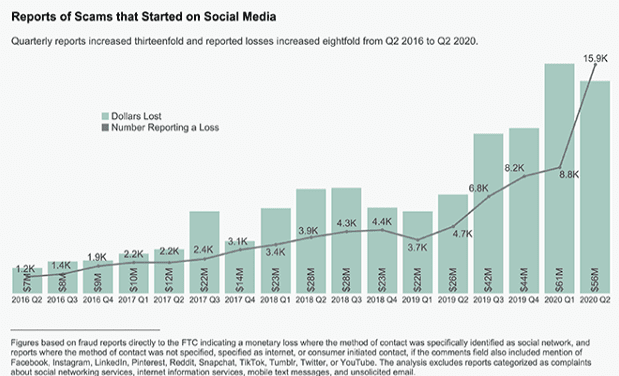
Social media has become the main “hangout” of the internet for people of all ages. 81% of Americans use YouTube and 69% use Facebook. There are also multiple other social sites, like Instagram (40%), Pinterest (31%), and the up-and-coming TikTok (21%).
Today’s youth have grown up with social media sites, and you’ll see that reflected in higher use statistics. For example, 71% of 18- to 29-year-olds use Instagram (over thirty percent more than the general population).
But the convenience of connecting to everyone from your great aunt to old long-lost schoolmates comes with a price. That price is privacy and safety if you aren’t using safety best practices.
Security Issues With Social Media
There are multiple security risks when you or a family member is using social media, especially if your page is public for anyone to see.
Some of the common (and scary) issues include:
- Social Engineering: Someone reaches out to you through a direct message wanting to “friend” you, but the ultimate motive is to scam you.
- Stalking by Predators: Predators often pose as kids to get other kids to trust them. They will also go after vulnerable singles looking for affection.
- Stolen Identity: The amount of information people share on their social media page is easily used by a criminal for identity theft.
- Loss of Privacy: Public postings on social media can be used by everyone from a spurned ex to a potential employer to discover more about you (and possibly things you’d rather they not know).
- Malware/Ransomware: One wrong click on a social media link that someone sends you through a social DM can lead to ransomware or other malware infection.
- Location Tracking: You may be having a great time in the Bahamas, and thieves that put two and two together know exactly when your home is going to be empty.
You would think that as time goes on, everyone would become savvier about social media dangers. But statistics from the FTC show that scams on social media are getting worse. In Q2 of 2020, over 80% more people reported losses from social scams than in the prior quarter.

FTC Report of Scams from Social Media
Best Practices for Social Media Safety
Make Your Page Private
Several social media sites, such as Facebook and Instagram, will allow you to make your social media page private. Meaning you can keep strangers from being able to see your page unless you give them specific permission.
Typically, you’ll have the ability to choose between letting only your connections (aka “friends”) see your page, or possibly friends of your connections.
Each site has different privacy settings, so it’s important to read through these thoroughly. Remember, just because you make your profile private to friends only, doesn’t mean those friends can’t share your posts on their timeline (that’s another setting!)
Restrict Sharing Preferences for Posts and Photos
Have you ever posted a family picture on your social profile that you meant just for your friends and family, but then found out a well-meaning friend had shared that image on their public profile page?
If you’re not careful, your images and posts can be seen by anyone on the internet even if your profile is set to private.
Review your security settings for configurations that allow you to restrict what others can reshare from your timeline.
Be Very Suspicious of Friend Requests & Unsolicited DMs
Fake friend invites are common on all social media platforms, even those used for business, like LinkedIn.
Scammers first try to connect with you using details from your social profile (e.g., “We like the same music!” or “I went to ABC School too!” It’s not hard for them to find out personal details about you from your posts.
Many often use flattery to bring someone’s guard down, i.e., “I just had to reach out because you’re so stunning.”
Just say “No” to friend requests and Direct Messages from people you don’t know. If you do a little homework, often you’ll find that a strange friend request has a page that is void of any real content other than photos of them with a puppy or the like.
Do Not Share Specific Personal Details
Sharing that you like strawberry ice cream on social media is fairly low risk but posting a photo of you eating ice cream outside your local mall, can allow a predator to zero in on your location.
Do not share specific personal details on social media ever. It’s surprising, but we’ve even seen people sharing their mobile phone number over an unprotected social page, leaving themselves open to SIM card duplication and other scams.
Kids, especially, need to know that they should never share details over social media such as their address, the school they go to, any after-school activities they participate in, etc.
Photo location tagging also needs to be off, so locations aren’t shared accidentally.
Watch Out for Impersonators
Social media scammers often impersonate famous people to gain your trust and get you to let your guard down. “Oh, Lady Gaga is friending me, how cool!”
There’s a reason that social sites use those blue checkmarks to verify the profiles of certain people. It’s to help others know which is the real person and which is a fake.
If you’re getting a DM from the lead singer of your favorite band, look for the blue checkmark before taking any action. If that’s not there, then the account is a scammer that’s impersonating someone else to trick you.
Get Help Securing Your Family’s Social Profiles
Carl’s Computer Care is here to help Louisiana families keep themselves secure from online scams and predators. We can help you with a full Online Family Safety session to assist with social settings, PC protections, and more.
Contact us today to schedule a consultation! Call 225-315-3498 or reach us online.
